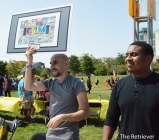Welcome Week and orientation make it easier for incoming students to connect with the diverse UMBC community prior to the start of classes, but about a month into their first semester some students are still discovering new possibilities on UMBC’s campus. Here is some of the information both new and returning students would like to share about UMBC.
Freshman biochemistry major Frank Furtado went to the First Year Experience and was surprised by the differences between college life and high school. When discussing the First Year Experience, Furtado said, “It talks about the different resources and tips to manage your first year at college. They talked about things like the office hours, SI PASS and peer mentors in the dorms. I would not have known about that.”
SI PASS, or Supplemental Instruction Peer Assisted Study Sessions, and student aid review sessions are held for various classes, and review topics commonly found on the course exams. A schedule for SI PASS is on the UMBC website, but some student review sessions have notifications sent to students through the UMBC email system. Both SI PASS and student aid review sessions are hosted by peer mentors who were selected because of their performance when previously taking the class.
Although junior biochemistry major Jeremiah Oghafua is a new transfer student here at UMBC, he also had some advice for new students entering college life. “As you’re getting deeper into your classes get to know your teachers a bit more personally,” Oghafua said. “If you can learn more about the people you’re going to class with get to know them, make study groups and stuff like that.”
Teachers hold office hours for students who want additional help, however they also allow students to get to know their teacher outside of class. It is not mandatory for students to attend office hours, but teachers usually encourage attendance. A teacher’s regular office hours can be found on their course syllabus, but many instructors will meet outside of their hours if asked in advance.
Freshmen biology major Ami Vodi both mentioned that she wished she knew more about the difference between Retriever dollars and Flex Dollars prior to their arrival. Vodi said, “I went to the Yum Shoppe, and I asked the guy in line if you could use flex and he was like I don’t see why not. So, I go to the front and the lady’s like we only accept Retriever dollars. It’s like, what are those.”
Both Retriever dollars and Flex dollars are currency that can be added to students’ red card. While Flex can only be spent on food and is part of a student’s meal plan, Retriever dollars can be used for most services on campus, and are replenishable. To check their balance of Retriever dollars and Flex dollars, students can go to MyUMBC and click on the Campus card button in billing and finances tab.
Sophomore computer science major Paul Dalton returned to UMBC this semester with a new understanding of the importance of community engagement. “As a commuter, my first semester here I didn’t know about Involvement Fest, so I really didn’t have any friends my first semester here,” Dalton explained. “College is what you make of it, and if you’re only here to study … you really won’t make many friends.”
There are over 200 organizations for students to join at UMBC. As a result, Involvement Fest is usually held for students at the start of the school year as a way to explore the different groups on campus such as UMBC Gaming, SEB and the S.T.A.R. Program. Students who missed Involvement Fest need not fear; there is also a group directory page on MyUMBC for those looking for a specific organization.
Freshman computer science and math double major Michael Romeo commented that he was happily surprised to learn about the school’s dietitian Nicole Arcilla in their 100Y English class. “I didn’t know we had a nutritionist or a dietitian. I didn’t know we had that on campus … I can go to the nutritionist and talk to her about the problem I’m having,” says Romeo.
It is free to meet with Arcilla, but students wishing to contact her have to schedule an appointment between the hours of 9 a.m. to 4:30 p.m. during Monday through Thursday or 9:00 a.m. to 1:00 p.m. on Friday. Other health services on campus include the UMBC Health Services Building, the Students with Disabilities Office and the Counseling Center.
From learning resources, clubs and more, there are many opportunities that new and returning students can explore around the school. As Furtado put it, “Everyone is really outgoing and willing to get you involved, and you have to make sure to take that step out.”

